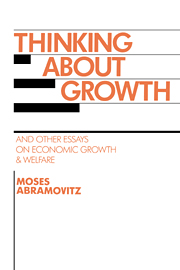Book contents
- Frontmatter
- Contents
- Editors' preface
- Preface
- Part I Growth and the economists
- Part II Studies in long-term growth
- Part III Long swings in economic growth
- Part IV Growth and welfare
- 10 Economic goals and social welfare in the next generation
- 11 Growing up in an affluent society
- 12 The retreat from economic advance: changing ideas about economic progress
12 - The retreat from economic advance: changing ideas about economic progress
Published online by Cambridge University Press: 22 March 2010
- Frontmatter
- Contents
- Editors' preface
- Preface
- Part I Growth and the economists
- Part II Studies in long-term growth
- Part III Long swings in economic growth
- Part IV Growth and welfare
- 10 Economic goals and social welfare in the next generation
- 11 Growing up in an affluent society
- 12 The retreat from economic advance: changing ideas about economic progress
Summary
A vision of the possibility of economic growth lies close to the center of the idea of progress in general. Francis Bacon, the great precursor of the idea, proposed that progress could be founded upon a steady increase in knowledge gained by the application of experimental methods. But Bacon also held that the real and legitimate goal of the sciences is “the endowment of human life with new inventions and riches” and, in J. B. Bury's words, “the amelioration of human life, to increase men's happiness and mitigate their sufferings.”
Bacon's outlook immediately suggests how closely intertwined are the notions of progress and economic progress. They are not the same since progress broadly conceived includes intellectual, moral, and spiritual advance, as well as other satisfactions, which are not closely constrained by the supply of scarce goods. The starting point of their connection, however, seems to be the possibility of increasing our command over nature and the output of goods. At the same time, there is a strongly held and plausible idea that if we are to cultivate our nonmaterial, intellectual and spiritual, potentialities, we can do so only to the degree that we are relieved from elementary poverty and repetitive toil.
Considering how crucial economic progress is to the idea of progress generally, it is perhaps ironic that classical economics emerged as a source of skepticism and disbelief in the possibilities of progress rather than as a source of support.
- Type
- Chapter
- Information
- Thinking about GrowthAnd Other Essays on Economic Growth and Welfare, pp. 322 - 351Publisher: Cambridge University PressPrint publication year: 1989



